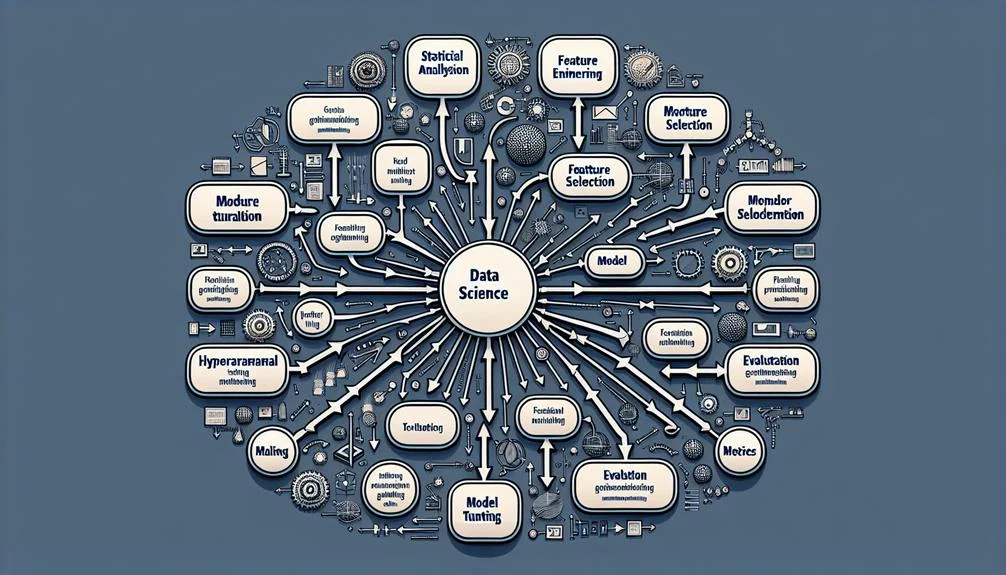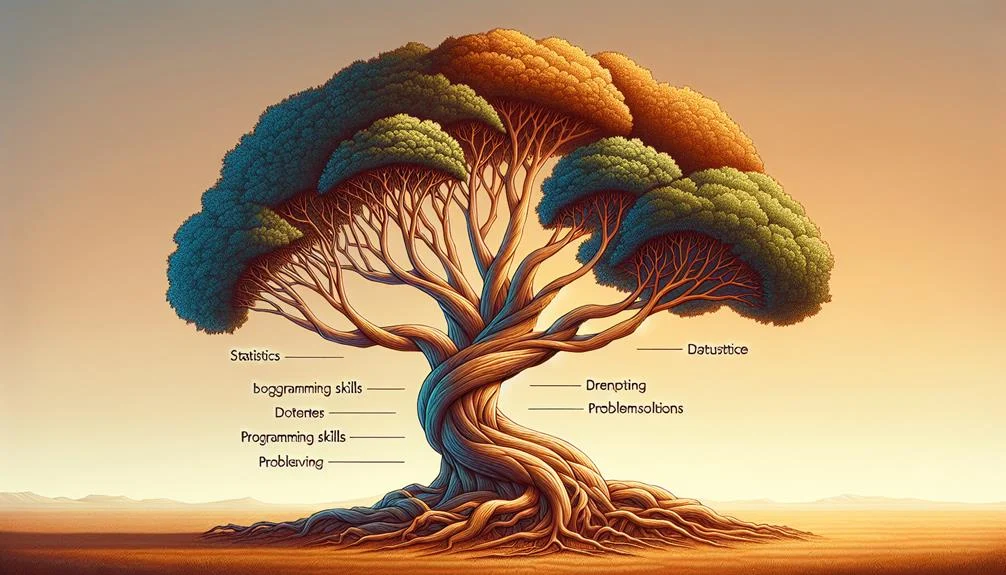The skills required in data science. In the fast-evolving world of data science, a specific set of skills has emerged as essential for professionals aiming to successfully navigate the complexities of data analysis and interpretation. These skills encompass a diverse range of technical competencies, from proficiency in programming languages to a deep understanding of mathematical concepts and statistical methods.
While these technical skills are undeniably vital, there is more to the story. To truly excel in the field of data science, one must also possess a unique blend of problem-solving acumen, collaborative prowess, and an unwavering commitment to driving impactful outcomes.
Key Takeaways
- Proficiency in Python, R, SQL, and NoSQL databases.
- Understanding of machine learning concepts.
- Strong analytical and problem-solving skills.
- Ability to communicate and visualize data effectively.
- Knowledge of statistics and data mining techniques.
Programming Languages Skills Required in Data Science
Proficiency in various programming languages is an essential requirement for data scientists to effectively manipulate and analyze data in their projects. Python stands out as a popular choice in data science due to its versatility and the availability of libraries like Pandas and NumPy, which facilitate efficient data manipulation.
On the other hand, R is often preferred for statistical analysis tasks, offering packages like ggplot2 for advanced data visualization.
SQL plays an important role in data science projects by enabling data scientists to interact with databases, perform complex queries, and manage large datasets effectively.
Additionally, knowledge of NoSQL databases such as MongoDB is crucial for handling unstructured data efficiently.
Mathematics and Statistics Skills Required in Data Science

An adept understanding of mathematics and statistics forms the foundational bedrock for data scientists to derive meaningful insights and predictions from complex datasets. Proficiency in calculus, linear algebra, and probability theory is essential for handling the mathematical aspects of data science.
Statistical analysis skills play an important role in interpreting data sets and extracting valuable information. Additionally, knowledge of Bayesian statistics enables data scientists to make informed inferences and predictions based on data patterns.
A strong foundation in high school mathematics provides the necessary groundwork for more advanced concepts in data science. Online courses specializing in data science mathematics cover a wide range of topics such as probability distributions and hypothesis testing, allowing aspiring data scientists to enhance their skills and knowledge in this field.
Data Mining Skills Required in Data Science

Data mining techniques involve the systematic gathering, sorting, and analysis of large datasets to extract valuable insights. In data mining, various techniques play an essential role in uncovering meaningful patterns and relationships within the data.
Two commonly used techniques are linear regression and clustering analysis. Linear regression helps in understanding the relationship between variables, making it useful for predictive analysis. On the other hand, clustering analysis groups data points based on similarities, aiding in segmentation and pattern recognition.
| Data Mining Techniques | Description | Application |
|---|---|---|
| Linear Regression | Establishing relationships | Predictive analysis |
| Clustering Analysis | Grouping similar data | Segmentation and pattern recognition |
| Data Sorting | Organizing data | Enhancing analysis efficiency |
| Data Analysis | Extracting insights | Informing business decisions |
| Comprehensive Courses | In-depth learning | Covering various data mining techniques |
Businesses rely on data mining techniques to make informed decisions driven by data insights. Understanding how to sort, analyze, and interpret data is essential for leveraging the power of data mining effectively. In-depth courses in data science often cover these techniques extensively, equipping professionals with the skills needed to extract valuable insights from large datasets.
Machine Learning Concepts

Machine learning concepts encompass various methodologies and techniques used to train algorithms to make predictions or decisions based on data patterns.
Supervised Learning:
In supervised learning, algorithms learn from labeled training data to predict outcomes accurately. It involves regression and classification tasks, such as linear regression, logistic regression, and support vector machines.
Unsupervised Learning:
Unsupervised learning deals with unlabeled data to uncover hidden patterns or intrinsic structures. Clustering algorithms like K-means and hierarchical clustering fall under this category, aiding in segmentation and anomaly detection.
Deep Learning:
Deep learning, a subset of machine learning, focuses on neural networks with multiple layers to analyze complex data. It includes convolutional neural networks (CNNs) for image recognition and recurrent neural networks (RNNs) for sequential data.
Feature engineering plays an important role in enhancing model performance by selecting relevant input features, while model evaluation and hyperparameter tuning optimize algorithm performance for accurate predictions.
Machine learning concepts find applications across diverse sectors like healthcare, finance, marketing, and natural language processing.
Effective Data Visualization

Utilizing advanced tools and techniques, effective data visualization plays a pivotal role in conveying complex data insights clearly and facilitating informed decision-making. Tools like Tableau, Power BI, and Matplotlib are instrumental in creating visually appealing data representations that aid in presenting intricate data analysis findings.
Through the use of various charts, graphs, and dashboards, data visualization enables the communication of trends, patterns, and outliers within the data, making it easier for stakeholders to grasp key information quickly.
In addition, data visualization enhances decision-making by providing a visual narrative that simplifies the interpretation of data, allowing for more informed strategic choices. Furthermore, data storytelling through visual aids enhances the communication of insights to a broader audience, bridging the gap between technical analysis and practical decision-making.
Soft Skills Required in Data Science

Soft skills play a critical role in the field of data science. Particularly, communication skills and team collaboration abilities are essential. Effective communication is necessary for data scientists to convey complex findings clearly. Strong collaboration skills enable data scientists to work efficiently with diverse teams and stakeholders. This ultimately leads to the success of data-driven projects.
Communication Skills Importance
Effective communication skills play an essential role in data science by facilitating the clear presentation of complex findings to non-technical stakeholders. Here are three key aspects highlighting the importance of communication skills in data science:
- Influencing Decision-Making: Data scientists with strong communication skills can effectively convey data insights, making a compelling case for specific actions. By presenting information in a clear and engaging manner, they can influence decision-making processes within organizations.
- Data Storytelling: Communication skills enable data scientists to engage in data storytelling, transforming raw data into a narrative that non-technical stakeholders can understand. This ability to translate data insights into actionable recommendations is vital for driving business outcomes.
- Enhancing Collaboration: Strong communication skills foster effective collaboration between data scientists, team members, and business stakeholders. Clear and concise communication of technical information ensures that everyone is on the same page, leading to more fruitful collaborations and successful project outcomes.
Team Collaboration Skills Required in Data Science
Collaborating effectively with team members is a fundamental aspect of successful data science projects. It requires a combination of active listening, open communication, and the ability to work harmoniously with diverse team members.
Data scientists must collaborate with stakeholders, data engineers, and business analysts to guarantee project success. Strong team collaboration skills are essential for brainstorming ideas, resolving conflicts, and achieving common goals in data science projects.
Building strong relationships and fostering a collaborative environment contribute greatly to successful data science team dynamics. By actively engaging with team members, data scientists can leverage each other’s expertise, share insights, and collectively work towards project objectives.
Effective team collaboration not only enhances project outcomes but also creates a positive and inclusive work environment. It is through teamwork, effective communication, and mutual respect that data science projects can thrive and deliver impactful results for stakeholders.
Problem-Solving Mindset

In data science, possessing critical thinking skills is essential for problem-solving. It enables professionals to approach challenges analytically and systematically. Analytical problem-solving capabilities allow data scientists to break down complex issues into manageable components and develop effective strategies to address them.
Additionally, strong decision-making abilities are vital for interpreting data insights and implementing solutions that drive business success.
Critical Thinking Skills
Developing a problem-solving mindset is essential for data scientists to effectively navigate complex challenges in the field of data science. Critical thinking skills play a pivotal role in enabling data professionals to analyze intricate problems, evaluate evidence, and make informed decisions driven by data.
Here are three key aspects highlighting the importance of critical thinking skills in data science:
- Identifying Patterns, Trends, and Outliers: Data scientists with strong critical thinking skills can sift through vast amounts of data to uncover valuable patterns, trends, and outliers that provide insightful information for decision-making processes.
- Driving Data-Driven Decision-Making: Critical thinking empowers data scientists to ask insightful questions, challenge assumptions, and drive data-driven decision-making within organizations, ensuring that choices are backed by robust data analysis.
- Developing Innovative Solutions: A problem-solving mindset, coupled with critical thinking skills, enables data scientists to approach challenges creatively, develop innovative solutions, and optimize data processes for enhanced efficiency and effectiveness.
Analytical Problem Solving
With a strong emphasis on systematic approaches to complex issues, analytical problem-solving in data science is essential for deriving meaningful insights from data.
Data scientists rely on their critical thinking skills to identify patterns, trends, and correlations within datasets, enabling them to solve real-world problems effectively.
By approaching challenges analytically, data scientists can design and implement strategies for data analysis and modeling, breaking down intricate problems into manageable components to develop innovative solutions.
This problem-solving mindset is vital for making data-driven decisions and deriving actionable insights that drive business success. Data scientists who excel in analytical problem-solving are able to navigate the vast amounts of data available to them, extracting valuable information to inform strategic actions and enhance decision-making processes.
To summarize, mastering analytical problem-solving is a fundamental skill that empowers data scientists to unleash the full potential of data and deliver impactful results.
Decision-Making Abilities
To excel in data science, possessing strong decision-making abilities rooted in a problem-solving mindset is essential for effectively analyzing complex datasets and deriving actionable insights.
- Critical Thinking Skills:
Data scientists must possess the ability to think critically to evaluate data, recognize patterns, and make informed decisions based on their findings.
- Analytical Approach:
Approaching problems analytically and systematically is vital for maneuvering through data complexities efficiently and deriving meaningful conclusions.
- Technical Expertise and Statistical Knowledge:
Effective decision-making in data science requires a combination of technical expertise and statistical knowledge, paired with logical reasoning, to drive actionable outcomes.
The fusion of decision-making abilities with a problem-solving mindset is fundamental. Data scientists rely on their critical thinking skills, analytical approach, and technical proficiency to extract valuable insights from data, enabling them to make informed decisions that lead to actionable outcomes.
Business Strategy Understanding

A solid grasp of business strategy is an essential asset for data scientists aiming to drive impactful insights and recommendations aligned with organizational objectives. Data scientists play a critical role in translating complex data findings into actionable insights that inform strategic decision-making. Proficiency in business acumen equips data scientists to identify key opportunities and challenges within a company’s operations, enabling them to contribute greatly to the growth of a business.
Data-driven decision-making hinges on a deep understanding of the business landscape, market trends, and competitive dynamics. By possessing a thorough comprehension of business strategy, data scientists can provide valuable insights that directly influence the success and expansion of a business.
Hence, a deep understanding of business strategy is imperative for data scientists to deliver high-impact analyses and recommendations that drive organizational success.
Continuous Learning Commitment

Continuous learning is a fundamental aspect of data science, requiring professionals to embrace a lifelong learning mindset. With the field advancing rapidly, data scientists must demonstrate dedication to enhancing their skills continuously.
This commitment allows individuals to adapt to evolving trends and technologies, ensuring they remain competitive in the dynamic industry.
Lifelong Learning Mindset
Demonstrating a relentless pursuit of knowledge and skill enhancement is essential for data science professionals to thrive in a rapidly evolving industry. In data science, a lifelong learning mindset is vital for success. Here are three key aspects highlighting the importance of a continuous learning commitment:
- Adaptability to Industry Trends: Data science professionals must actively stay updated on the latest industry trends and advancements to remain relevant in the field. Embracing new technologies and methodologies is pivotal to adapting to the dynamic landscape of data science.
- Investment in Ongoing Education: Engaging in continuous learning through participation in courses, workshops, and self-study not only enhances expertise but also contributes significantly to career development. This ongoing education ensures that professionals are equipped with the most current knowledge and skills required in the data science domain.
- Demonstration of Relevance: Embracing a commitment to continuous learning showcases a professional’s dedication to staying abreast of industry changes and maintaining relevance in the ever-evolving data science landscape. This mindset not only fosters personal growth but also contributes to the overall advancement of the field.
Skill Enhancement Dedication
In data science, maintaining a steadfast commitment to continuously enhancing skills is imperative for professionals seeking to excel in a rapidly evolving industry. Data scientists must prioritize continuous learning to keep pace with evolving technologies and industry trends. This dedication to skill enhancement involves regular practice in coding, statistics, and machine learning.
By engaging in online courses, workshops, and bootcamps, data scientists can stay updated with the latest advancements and further their career growth.
The evolving nature of data science necessitates a commitment to lifelong learning to remain competitive and relevant. Data scientists should allocate time and effort to continuously improving their technical, analytical, and soft skills. Embracing a mindset of continuous learning not only enhances individual proficiency but also contributes to the overall development of the data science community.
AI Knowledge

- Understanding of Machine Learning Algorithms and Deep Learning Techniques:
Proficiency in machine learning algorithms and deep learning techniques is foundational for AI knowledge in data science. This knowledge enables data scientists to build predictive models, extract insights, and make informed decisions based on data analysis.
- Proficiency in Python and R:
Mastery of programming languages like Python and R is essential for implementing AI solutions in data science projects. These languages offer robust libraries and tools that facilitate the development of AI applications, making them indispensable for data scientists working in AI.
- Knowledge of Neural Networks, NLP, and Computer Vision:
Familiarity with neural networks, natural language processing (NLP), and computer vision is essential for leveraging AI applications in data science. These technologies play an important role in tasks such as image recognition, language understanding, and pattern recognition, expanding the capabilities of data science projects.
Conclusion
The key skills required in data science are akin to the intricate threads of a tapestry, weaving together technical proficiency, mathematical acumen, problem-solving abilities, and effective communication.
Data scientists must continuously refine their skills in programming, statistics, and machine learning to unravel complex data patterns and drive impactful outcomes.
By embracing a mindset of continuous learning and staying abreast of evolving AI technologies, data scientists can navigate the dynamic landscape of data science with confidence and expertise.





